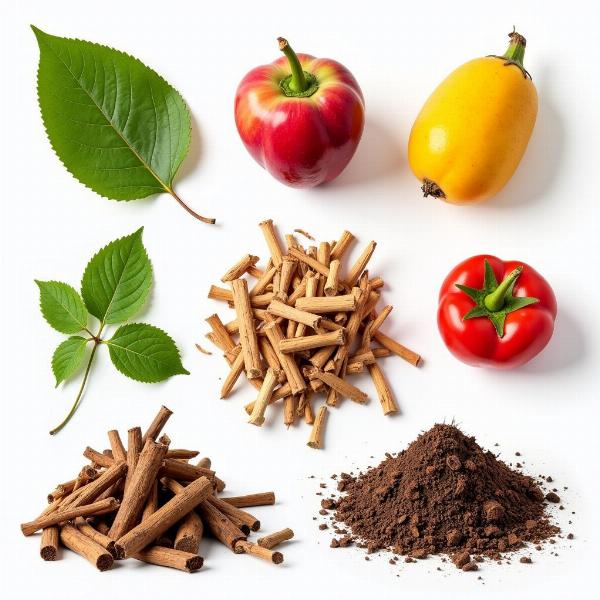Understanding the meaning of “organic material” in Hindi is crucial for various fields, from agriculture and environmental science to everyday conversations. This term, commonly encountered in discussions about farming, composting, and even healthy living, has specific connotations in the Hindi language that reflect India’s rich agricultural heritage and traditional practices. Let’s explore the different ways “organic material” is expressed in Hindi and delve into its cultural significance.
Understanding “Organic Material” in Hindi
The most common Hindi translation for “organic material” is कार्बनिक पदार्थ (kārbनिक padārth). This term accurately captures the scientific definition of organic matter, referring to substances primarily composed of carbon-based compounds derived from living organisms or their remains. It encompasses a wide range of materials, including plant matter, animal waste, and microorganisms. However, in everyday conversations, other terms might be used depending on the specific context.
 Examples of Organic Material
Examples of Organic Material
Different Contexts, Different Terms
While “कार्बनिक पदार्थ (kārbनिक padārth)” serves as a general translation, Hindi offers a rich vocabulary that distinguishes between various types of organic materials based on their origin and use. For instance, जैविक पदार्थ (jaivik padārth) is often used to refer to biological materials, particularly in scientific contexts. When discussing agriculture, terms like गोबर (gobar) (cow dung), खाद (khād) (manure), and हरी खाद (hari khād) (green manure) are commonly employed, highlighting the importance of these organic materials in traditional farming practices.
What Does Organic Material Mean in Gardening?
In gardening, “organic material” generally refers to compost, mulch, and other natural soil amendments. These materials improve soil structure, fertility, and water retention. In Hindi, gardeners might use terms like कम्पोस्ट (kampost) (compost), मल्च (malch) (mulch), and जीवांश (jīvāṁś) (organic matter) when discussing soil improvement.
Organic Material vs. Inorganic Material
The distinction between organic and inorganic materials is crucial in various fields. While organic materials are derived from living organisms, inorganic materials originate from non-living sources. In Hindi, inorganic material is translated as अकार्बनिक पदार्थ (akārbनिक padārth). Understanding this difference is essential for proper waste management, recycling, and environmental conservation.
The Importance of Organic Material in Indian Agriculture
Organic farming has deep roots in Indian agricultural traditions. For centuries, farmers have relied on organic materials like cow dung, crop residues, and animal manure to enrich their soils and maintain soil health. These practices, passed down through generations, emphasize the interconnectedness of nature and human well-being.
Is “Organic Material” Always Beneficial?
While organic material is generally considered beneficial, excessive amounts can sometimes lead to environmental problems. For instance, excessive application of manure can contaminate water sources with nitrates. Understanding the appropriate use and management of organic materials is crucial for maximizing their benefits while minimizing potential risks.
Conclusion
Understanding the meaning of “organic material” in Hindi is essential for anyone interested in Indian agriculture, environmental science, or simply everyday conversations. From the scientific term “कार्बनिक पदार्थ (kārbनिक padārth)” to the more context-specific terms like “गोबर (gobar)” and “खाद (khād),” Hindi offers a rich vocabulary reflecting the cultural significance of organic materials in India. By embracing these traditional practices and incorporating modern scientific understanding, we can promote sustainable agriculture and environmental stewardship.
FAQ
- What is the most common Hindi translation for “organic material”? कार्बनिक पदार्थ (kārbनिक padārth)
- What are some other Hindi terms related to organic material in agriculture? गोबर (gobar) (cow dung), खाद (khād) (manure), and हरी खाद (hari khād) (green manure)
- What is the Hindi word for “compost”? कम्पोस्ट (kampost)
- What is the opposite of “organic material” in Hindi? अकार्बनिक पदार्थ (akārbनिक padārth) (inorganic material)
- Why is organic material important in Indian agriculture? It improves soil health, fertility, and water retention, supporting sustainable farming practices.
- Can organic material be harmful? Excessive amounts can sometimes cause environmental problems, highlighting the importance of proper management.
- Where can I learn more about organic farming in India? Numerous resources are available online and in libraries, including government publications and agricultural organizations.
Meaning-Hindi.in: Your Partner for Hindi Translation
Meaning-Hindi.in offers expert translation services in various domains, including business, legal, technical, website localization, educational, and specialized fields. We provide accurate and culturally sensitive translations, catering to diverse client needs. Our team understands the nuances of the Hindi language and the cultural context of India. For high-quality Hindi translations, contact us at [email protected] or call us at +91 11-4502-7584. Meaning-Hindi.in is your trusted partner for all your Hindi translation needs.